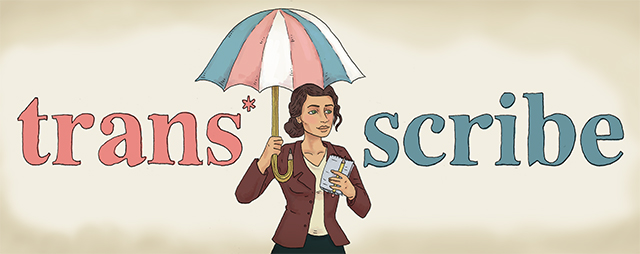feature image via avgocaroline
trans*scribe illustration © rosa middleton, 2013

“My name is Sarah Szabo, and I’m a twenty-two year old transsexual,” goes a sentence that, not five years ago, I never thought I’d ever say. Five years ago, I was a high school graduate on way to being a college freshman. Also, a boy. My name was Josh, I had a beard, and I had a secret. I was lugging around a weight that any closet-familiar queer kid likely knows a thing or two about, that kind of smirking, “if-you-only-knew” knowledge of the self, held close and very personal behind a cloudy facade. I’m a woman and I know it, I’d think to myself. I wonder if I’m ever gonna tell anybody.
For transgender people, the closet isn’t so much a place you hide in as a jail you’re stuck inside. It’s not just that you can’t have the life experiences you want—your hormones feel wrong, your body looks wrong, your clothes hang wrong, and you hate your haircut. It’s like there’s another You in you, and if you’re closeted, your biggest wish for the longest time is that they’ll simply go away. If you’re ostensibly a straight man, like I was, you feel a little like a Dr. Jekyll-type doing your very best to snuff out a persistent and annoyingly faggy Mr. Hyde.
This isn’t to belittle the experience of gays and lesbians, who historically have been subjected to just as much persecution and misunderstanding as a people could possibly be. But a distinction between the gay experience and the trans experience needs to be made clear, especially in the modern West, where many transsexuals, myself particularly, often feel marginalized, even in social contexts that are ostensibly their safe places. The LGB(t) community, if you will.
The biggest difference today between the coming-outs of homosexuals and transsexuals is that only the latter group still feels an overwhelming pressure to explain themselves. While being gay isn’t easy, the definition is—”two men or two women in love.” No such luxury for the young transgender kid, terrified out of their mind and facing questions from all sides, with barely the bravery to answer. “Is it a sex thing?” “So you’re gay, right?” This isn’t to mention the boundary-shattering obsession with genitalia. “Pre-op or post-op,” I’ve literally been asked. Never answered. How about the story of your junk first, jackass.
So it’s terrifying, coming out, needing to both reveal your most tormented secrets and at the same time justify them to a roiling ocean of your perplexed peers. Not to mention your family, who for all you know will turn heel and show you the door forever over any misstep you may make, being so crude as to flip the script on your gender at them like that. I’ve never cried so much, nor been so scared to open my mouth in front of my mother as I was when I came out. I waited til I was 18 to do it, deliberately, with a harebrained notion that if I were to somehow be completely disowned, at least I’d be a legal adult and therefore, I don’t know, magically capable of handling it.
These fears would prove unfounded. Over the last four years, my incredible parents have basically done the equivalent of bringing me the moon and stars down from the sky, through all the things they’ve done for me. They are amazing people, and I know I’m fortunate, but even they had troubles grasping what it truly meant for them and me, the first time I told them, “I’m a girl.” I knew they probably would. Also, I knew I’d have trouble saying the words.
So I wrote a letter. I wrote a letter which I let everyone in my life read for themselves, with words I’d spent weeks prior stitching out, gently field testing them with two of my best and closest friends beforehand. I based its contents off of scarce accounts of others’ experiences online, watching for what was said most often, and doing my best to synthesize a perfect version of a speech I’d only ever have one shot at.
A therapist—not mine, rather my grandmother’s, who I don’t see too often—later said that the letter I wrote was the best example of a trans-oriented coming-out letter she’d ever read, and sought my permission to share it with other therapists, and patients; a kind of template for a task that’s very hard to do. I don’t know if she ever did, but I know that she made me want to. I’m sharing this now solely with the hope that doing so might make the hardest moment of someone else’s life just the slightest bit easier.
A lot of powerful memories came up for me, revisiting this letter—the way my mom cried and embraced me when she read the name I’d take; the way my brother slowly sank to the floor as he read it, in the hall; the overwhelming acceptance my fledgling college friends gave to me, the first response I received being “Szabo, I have nothing but respect for you.” Mostly I remember how happy I was, the moment it was public, eighteen years of fear, giving way to a budding peace. My transition’s still my greatest triumph, and when I see this letter, I see the trembling kid at the journey’s start, completely unaware of what a good decision she was making, hoping like crazy that she’d be okay. This letter is now for those whose journeys are still beginning. I was stuck in the closet once—here’s what I used to break out.
With this letter, I came out to the world as a transgender person on New Year’s Eve, 2008. To this day, it’s the only New Year’s Resolution I’ve ever kept.







